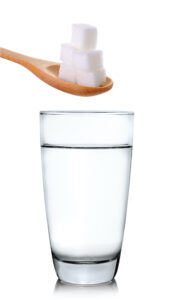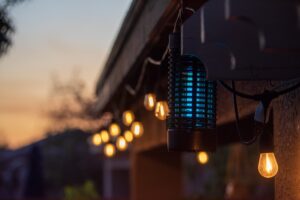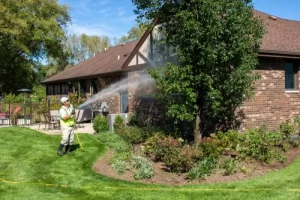READ ALL ABOUT IT
CHECK OUT OUR BLOG FOR CHICAGOLAND & SOUTHERN WISCONSIN
Homemade Mosquito Trap Better Than Spraying?
Is My Homemade Mosquito Trap Better Than Spraying?
Even if you have been lucky enough to have not spotted or have been bothered by mosquitoes so far, you won’t be able to escape them this summer. It might be time to start setting up some mosquito traps to try to curb your mosquito population, but is a homemade mosquito trap better than spraying?
Mosquito Trap
There are often lots of easy mosquito traps circulating the internet. A particularly popular trap a few years ago revolved around cutting a two-liter bottle in half and inverting the top. The trap would use yeast and sugar to lure in mosquitoes, where they would drown in the sugary water. The problem was that it didn’t work. At the very best, there were a few scattered successes, but most comments found dissatisfaction.
Mosquito traps usually work by tricking mosquitoes into drowning themselves. Mosquitoes lay their eggs in still-standing water. Many traps will work by luring in a mosquito with something sweet like sugar or something that produces carbon dioxide (which mosquitoes use to find prey) like yeast. Usually, there is also a substance, such as detergent, that will remove the water’s surface tension. Once a mosquito comes in to rest on the water, they slip in and drown.
Many traps will work by luring in a mosquito with something sweet like sugar or something that produces carbon dioxide (which mosquitoes use to find prey) like yeast. To activate the yeast and start the process of creating carbon dioxide in the trap, simply add the active yeast packet to the mixture of cooled water and sugar without stirring. As the yeast becomes activated, you may notice some bubbling, indicating that the process has begun. This bubbling action is a good sign that the mixture emits a delicious scent, attracting mosquitoes to the trap.
There are also high-velocity wind traps. These traps often use high-velocity fans to push mosquitoes into a mesh covered in a toxic substance, such as rubbing alcohol. However, these traps tend to take up a bit of space. It’s also essential to have a fan strong enough to overpower and pin down mosquitoes, which often involves buying a high-velocity fan. The mesh can also be sometimes difficult to find, which makes the trap less accessible and convenient to use. Additionally, strong fans can sometimes make noise that people find irritating when they prefer quiet and can take up electricity.
Homemade mosquito traps can be effective in helping to reduce the mosquito population, but the results can be hit or miss. When they don’t work, it’s often difficult to figure out the tweaks and tricks needed to make them as effective as a blog article promised.
The efficacy of mosquito traps can also vary from location to location due to differences in the abundance of species, wind velocity and direction, temperature, available habitats, tolerance, and spread. There are over 200 types of mosquitoes in the continental US and other US territories, so one trap often might not work for the particular mosquitoes in your local area.
Mosquito traps also sometimes attract other bugs you don’t want, such as flies and even cockroaches. More problematic is that traps may even draw in more mosquitoes than they can get rid of.
Mosquito traps have potential and may play a larger role in mosquito control as they continue to be developed and refined, but they definitely shouldn’t be overestimated. Due to their shortcomings, it’s hard to say that a homemade mosquito trap is better than spraying your space with something you know will remove the mosquitoes. Even if you have traps out, it’s still worth considering professional mosquito control.
Mosquito Catcher
There have been attempts to create more professional, commercialized mosquito catchers. Popular brands include Flowtron, MosquitoMagnet, and Blue Rhino SkeeterVac.
They can be effective, but come with their own set of drawbacks. For example, popular mosquito catchers, such as a dynatrap, can require an AC outlet to function. If your AC outlet is already occupied, it might not be worth unplugging it and dealing with the heat. Some require batteries, which will need to be changed, and some are powered with propane tanks, which can be dangerous to have around the house.
Many of these traps also need to be put out in your yard. If the mosquito catcher needs to be plugged in, it often means that there will be a long table running out into your yard, which can be difficult to avoid when using your lawnmower. Besides using mosquito traps and mosquito catchers, there are other ways to keep your lawn free of mosquitoes, such as clearing gutters and getting rid of still water.
Many traps attract mosquitoes with sweet substances or carbon dioxide, which they use to locate prey, such as yeast. Additionally, a detergent is often used to break the water’s surface tension, causing mosquitoes to slip in and drown. This process effectively captures mosquitoes within the trap, preventing their escape and reducing the overall mosquito population in the area.
How Do I Assemble the DIY Mosquito Trap?
To create your own DIY mosquito trap, follow these steps:
Step 1: Gather the needed materials, including a plastic bottle, hot water, a marker, box cutter, tape, yeast, and brown sugar.
Step 2: Mark the plastic bottle halfway down and draw a circle around it as a cutting guide.
Step 3: Carefully cut the bottle in half using a box cutter.
Step 4: Heat 1 to 1 1/3 cup of hot water, pour it into the bottom half of the bottle, and add brown sugar. Let it cool for about 20 minutes.
Step 5: Add a packet of active yeast to the sugar-water mixture. Do not stir.
Step 6: Assemble the mosquito trap by placing the top of the bottle (lid down) into the bottom half like a funnel and seal the edges with tape.
Your DIY mosquito trap is now ready to lure mosquitoes with carbon dioxide and trap them to prevent them from escaping and breeding further. Enjoy a buzz-free outdoors using your homemade mosquito trap!
How Long Does It Take to Make a DIY Mosquito Trap?
Creating a DIY mosquito trap typically requires about 15 minutes of your time. Kids can even enjoy making this natural trap (except for the box cutter and hot water). Homemade mosquito traps can be a fun and educational project for children to participate in. Many materials required for these traps, such as two-liter bottles, sugar, yeast, and water, are safe for kids to handle under adult supervision. Involving children in the creation of the trap can serve as a great opportunity to educate them about mosquitoes and how traps help manage their population. It is essential to guide them carefully and ensure they comprehend the safety precautions when working with the materials.
Mosquito Killer
If you’re looking for better efficacy, nothing beats professional mosquito spraying. Mosquito spraying means spraying your space with insecticide, often after the property has been evaluated and deemed appropriate for spraying. The spray serves as a mosquito killer, effectively ridding your yard of mosquito pests. If you’re looking for reliable, professional sprayers, Skeeter Beater is a family-owned, affordable and reliable solution to all your mosquito problems in the Chicagoland area.
A common complaint about mosquito killers and sprays is that it is often expensive. Skeeter Beater understands this and we have various packages to help tailor our service exactly to your needs. You can have a one-time spray or have it recurring as often as weekly if desired. We will guarantee that you get precisely what you pay for and won’t have to spend a cent more than needed!
There are also often concerns about pesticides used in mosquito spraying and how they can harm us and our loved ones. Skeeter Beater uses natural extract from chrysanthemum flowers, which has been used for thousands of years to control mosquito populations. It’s a natural compound that is considered safe for children and pets. Certain pesticides using chrysanthemum flowers have even been approved for organic agriculture. Rest easy knowing that we provide safe, effective, affordable solutions to your mosquito woes.
So if you’re looking to avoid those painful bites and irritating itches, then choosing professional sprays over homemade mosquito traps is likely the way to go. Get a free quote from Skeeter Beater today and you’ll never have to worry again if your homemade mosquito trap is better than spraying. Say goodbye to questionable homemade mosquito solutions and enjoy your mosquito-free space!



